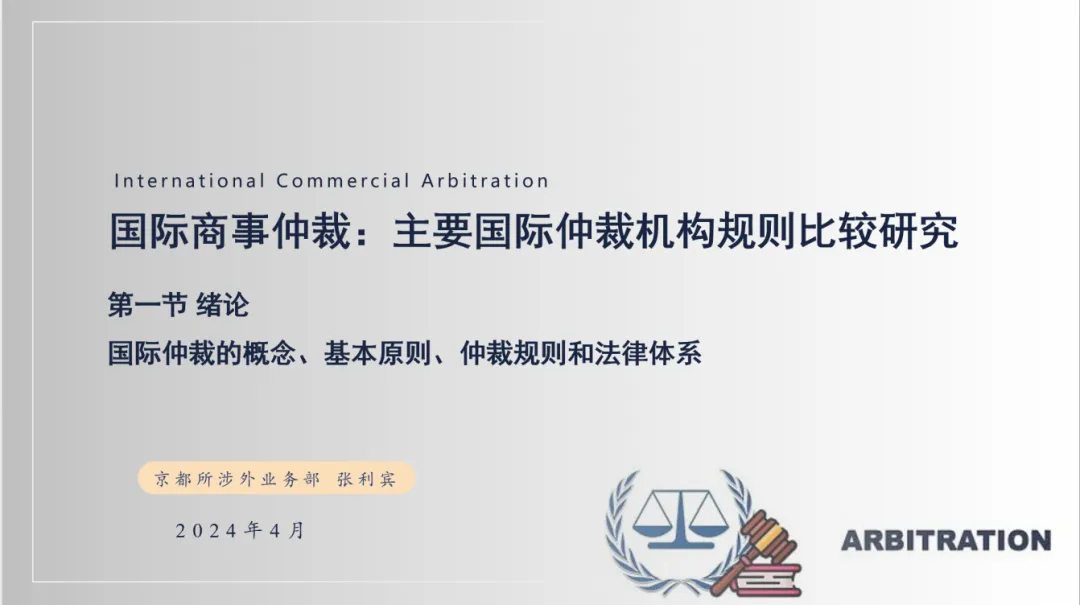In the spring semester of the first half of 2024, the School of LLM of China University of Political Science and Law offers the course “International Commercial Arbitration: A Comparative Study of the Rules of Major International Arbitration Institutions (Bilingual)” as one of the compulsory courses for the postgraduates of LLM program in the direction of international arbitration. The course is taught by Mr. Zhang Libin, the partner-in-charge of the foreign-related business department of King&Capital, who has rich theoretical knowledge and practical experience.

Lecturer
Mr. Zhang Libin, senior partner of King&Capital Law Firm, graduated from the University of Texas at Austin College of Law in 1997 and obtained his J.D. degree. Mr. Zhang has twenty-five years of legal experience in international law firms as an associate and partner, and was a partner at Baker Botts in the U.S., where he focused on energy projects and dispute resolution in the energy industry. He is also an arbitrator for DITC, Bei Zhong, Hong Kong Zhong and OHADA Africa. He is a member of the Users' Committee of the Singapore International Arbitration Center (SIAC) and a member of the Swiss Arbitration Association (SAA). He is an executive director of the China Energy Law Society and a member of the Comparative Law Society of the China Law Society. He is also a registered expert of ISO TC 309 in China, and participated in the drafting and revision of ISO 37301 into Chinese National Standard 35770, and the new ISO Standard 37302.
Background and Objectives of the Course
This course is one of the ad hoc courses of the special cultivation program for postgraduates of LLM degree (International Arbitration) of China University of Political Science and Law. The program aims to cultivate a group of innovative, complex, applied and international arbitration rule of law specialists who adhere to Xi Jinping's thought on the rule of law, have a good understanding of the international arbitration rules, master the professional skills of foreign-related law, and skillfully utilize foreign legal languages, and who are both virtuous and talented at a high level, for domestic arbitration institutions, legal service institutions and enterprises and institutions that carry out foreign-related business. In addition, LLM students in the direction of foreign-related lawyers can also take this course.
This course aims to provide the students of LLM School with the opportunity to gain an in-depth understanding of the legal practice in the field of international commercial arbitration. It is hoped that through the study of the world's major international arbitration rules and the discussion of practical issues, the students will have a systematic understanding of the international arbitration system and rules, learn to think about the issues in a more sophisticated and logical way, and become the high-end legal talents who are able to skillfully use the rules of international arbitration in the practice.
Course Content and Features
This course will guide students to take the UNCITRAL Arbitration Rules as a model, and conduct a comparative study on the arbitration rules of the world's major arbitration institutions (such as the ICC Court of Arbitration, the London Court of International Arbitration (LCIA) and the Singapore International Arbitration Center (SIAC)).
There are eight topics in this course, covering the concepts and principles of international arbitration, arbitration agreement and jurisdiction of the arbitral tribunal, commencement of arbitration proceedings and emergency arbitration and interim measures, appointment, recusal and replacement of arbitrators, application of substantive law and the principle of fairness and reasonableness, the combination of arbitration and conciliation, as well as the rules of evidence and court proceedings. Each topic contains practical case studies and reflection questions, which help students better understand and apply what they have learned.
In addition to the theoretical introduction to the concepts and principles of international commercial arbitration, the course also focuses on teaching and discussing practical topics. In the course, students can get in touch with real cases and first-hand materials in practice, and learn and practice their basic skills in arbitration practice, such as drafting arbitration agreements and writing arbitration applications.
The teaching method of this course is rich and varied, focusing on cultivating students' active thinking ability and emphasizing the training of practical skills in arbitration. In addition to one-way lectures by the teacher, the course also emphasizes the interaction between students and the teacher and between students, including classroom simulation, Q&A and group discussion, etc., so that students can experience the roles of lawyers and arbitrators, and better understand and master the rules of international arbitration through diversified teaching methods.
Conclusion
The launch of this course will provide a platform for students to gain a comprehensive understanding of the rules of international commercial arbitration and to cultivate their professional competence in transnational commercial dispute resolution.
Mr. Zhang Libin and his team of King&Capital lawyers will continue to support legal education, establish cooperation with more famous law schools both at home and abroad, transfer practical experience to more students, and dedicate to cultivate legal talents with international vision and practical ability, so as to promote the common development of law teaching and legal practice.




